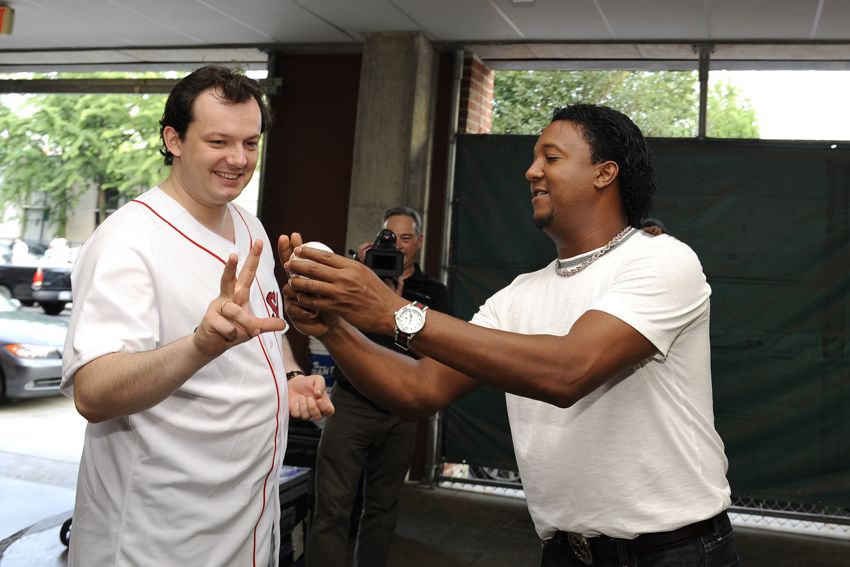Q&A: New BSO Maestro Andris Nelsons

Pedro Martinez gives Andris Nelsons a lesson before he throws out the first pitch at Fenway Park. (Photo by Stu Rosner)
Andris Nelsons had quite the big day on Tuesday. In fact, it was officially “Andris Nelsons Day” as decreed by the City of Boston. The new Latvian musical director for the Boston Symphony Orchestra had just flown into town from London, and at 11 a.m. he signed his contract at Symphony Hall before the eyes of the media and BSO supporters, then answered a public Q&A. He did phone and in-person interviews for a large chunk of the afternoon while squeezing in rehearsals with a BSO brass ensemble that he later conducted when he was honored by the city at Faneuil Hall and again at Fenway Park. And if that wasn’t enough pressure, he had to throw out the first pitch at the Sox-Rockies game. Then he flew back to England and his current job with the City of Birmingham Symphony Orchestra. Nelsons begins in his new role with the BSO’s 2014-2015 season, though he will be conducting them for a concert or two at Tanglewood in the summer and at Symphony Hall during this season.
Who knows, perhaps James Levine secretly had a killer split-finger fastball, but it’s hard to imagine Nelsons’ brilliant but famously aloof predecessor doing any of this. In person, Nelsons was instead warm, thoughtful, and most importantly, accessible. And amidst all these events, surely the highlight of Nelsons’ day must have been talking with Boston magazine about his hiring and his plans for the future of the BSO:
Matthew Reed Baker: Here in Boston, the BSO is a huge institution like one of our sports teams, and the attention paid to the search for a new musical director was much like finding a new manager for the Red Sox—except it took a couple years. How do you feel coming to Boston with this kind of intense spotlight? Do you feel pressure, or are you glad for it?
Andris Nelsons: I’m extremely excited and honored, as it is, of course, one of the world’s best orchestras. But there is pressure and it is a big responsibility, and I feel that. But I also feel that what we’re doing is performing music, which is the food for our souls. It brings us all together, people of different nationalities and different ages, through music. It’s an international language, and it makes us here feel extremely excited to perform music of such a great quality. I always felt such great support from the orchestra from the first moment I performed with them [in 2011]. I owe that to the great chemistry with the orchestra. That’s very important part to me, to have a sort of family feeling with the orchestra and also with the audience. You have a great result if the orchestra trusts the conductor, and the conductor trusts the orchestra.
Also I know that Boston is one of the great centers of intellectual culture as well as sport. It’s one of the centers of America, with a great orchestra, great sports, great hospitals, and great universities. Being from Europe, I feel it’s quite familiar here—it’s quite European. I will start in fall ’14, I will experience this city for many years to come and will build up the relationship with the audience and the orchestra and the community. I’m already very excited. I felt so welcomed this morning when I met with members of the audience, and subscribers, and musicians. I’m really looking forward to developing that warm feeling.
You’ve conducted the BSO on various occasions before, so the orchestra is familiar with you. But now you’re not a guest anymore, but the boss. How do you go forward building a relationship with the musicians?
As the musical director, you have a lot of responsibilities about many things: about repertoire and artistic direction, as well as administrative things, together with the connections to the audience and the society. For me the main goal is loving music and experiencing the great music-making with the orchestra, which is the great reason why I conduct, and that is the main goal. You can sometimes start to think too much about things which are besides music. Of course these things are important and part of the job, but the main part is the great quality of honest, highly emotional, professional music-making. I put that number one, then everything else comes with it. Artistic goals come first, meaning concerts and activities in Boston, but also we have ambitions to go on tour in Europe and South America and the Far East.
Beyond touring, there are recordings and other media things. I like to think of a good doctor who can heal and diagnose, and if he can do both, he’s a good doctor. Sometimes a doctor can talk a lot and but can’t make a good diagnosis, and sometimes you can talk about music but not be a good musician. So first comes the quality of music-making you share with the audience and all kinds of people. It’s important that in society as many people as possible are coming to concerts and seeing how great orchestra is in Boston. I would them to feel that coming to concerts would be part of their regular activities. One night they’d go to a hockey game or baseball game or basketball, or they might go to a nice restaurant, but also they’d come to a concert, so that it’s part of the lifestyle here. Society needs that. Music is such an important part of society, and the Boston Symphony Orchestra offers such great quality, and we just want to share it.
I’m not a big fan of dividing music into segments—it’s all music. But still, I still have to ask: What music do you plan to perform that is in the main canon, and what composers do you plan to explore that are more esoteric or contemporary?
It’s a combination of things. One direction of repertoire, of course, is the Germanic tradition, which is very close to me, with my education and the location of Latvia. I’ve been influence by western Germanic culture and its musical tradition: the Vienna classics, Hayden, Mozart, Beethoven, Brahms, Richard Strauss, Mahler, Bruckner. Wagner, of course. Then the other part that is a big influence on me is the Slavic, the Russian and Eastern part of Europe: Tchaikovsky, Prokofiev, Shostakovich, Bartok, Dvorak. These are the two directions I feel closest to, generally. Then I love the French repertoire, which is a big tradition that the BSO has. And of course I want to explore and bring some contemporary music in combination with the great classical repertoire. Mostly I’ve conducted European contemporary composers and I want to bring some here, but I also want to explore American composers. I’m very open. But we want the audience to emotionally satisfied, and to feel like it’s been an event after they’ve left the concert.
Music is so much about the heart and about the emotionality and the atmostphere, but it also has to do with the intellect. Some people like music from an emotional point of view, and others like it more analytic and intellectual, and to fulfill both is the expectation. Personally I am very emotional-orientated. I feel you have to emotionally fulfilled. If you feel cold and don’t have an emotional reaction, then it’s not a good concert. You bring the atmosphere and the fantasy of the music, so that people say “I couldn’t sleep that night,” because they’re still thinking about that experience. You don’t want them to say, “Yes, it was a great composer, but I didn’t feel anything.” It’s like food for our soul. We feed people with our music.
Much has been made of the fact that, at age 34, you’re the third-youngest of the 15 musical directors in the history of the BSO. I find this exciting, both because I hope you’d bring some new energy, but also stability over the long haul, as you plan to grow here. With that in mind, what are your short-term goals, and what would you like to achieve over the long-term?
The first short-term goal is to get to know the orchestra much better. I’ve performed with them several times, I want to get to know the orchestra deeply, personally and musically, and so they get to know me and that we get a feeling of 100 percent trust on both sides. And then we make great music together. It’s just a simple first goal. You have this feeling of unity, and you understand each other like it’s a family. You build a long-term relationship, which then involves concerts in Boston and touring and recording and social activities. But first, you have to have great chemistry which we have, but I want to experience it on regular basis working 12 weeks or more a year, so that every concert is growing contact and understanding. If you don’t have trust or support, then you can’t succeed.
In the meantime, for us musicians we can’t exist without the audience. We need the audience to be part of the experience. We play because we love music, but not if you play in an empty hall. We want to attract more of an audience. Maybe because I’m a young conductor and we have students here, I want them to go to the hockey game as I mentioned, but also to feel a necessity to come to concerts, to realize how great the symphonic playing is here in boston. It’s all challenges, and it’s difficult to answer. I’m just starting and I have dreams and expectations and excitement, and I’m sure that we will fulfill the expectations of the audience, that’s what’s most important.
You made your debut conducting the BSO in March 2011, conducting Mahler’s Ninth Symphony. Could you have imagined then that just two and a half years later, you’d be the musical director?
No, I was happy to be a guest but I would never have expected to be musical director at that point. [laughs]


